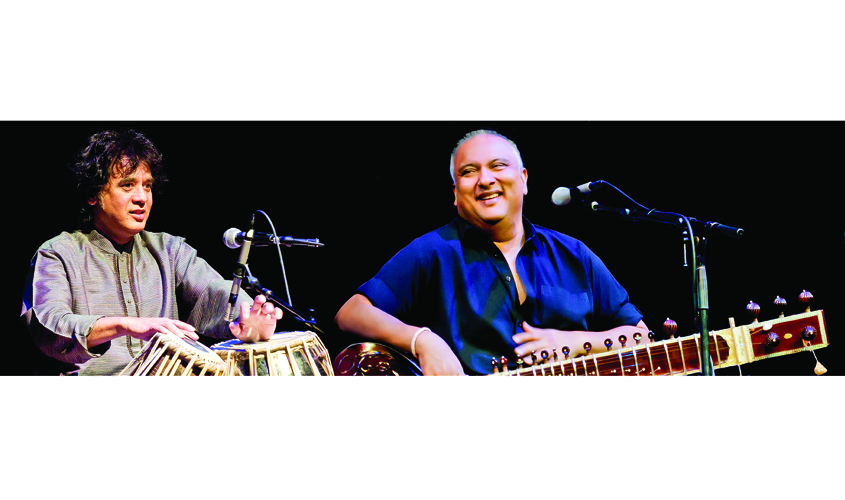Q. You are the seventh generation of the Imdad gharana. Could you talk about your family legacy?
A. This is the seventh generation of musicians, one after another, and so it is a wonderful thing that the eldest son of the family is taking up the same music. So, it’s our family tradition — my grandfather started playing the sitar and then my father started doing it. So, it’s one of the oldest musical lineages in India.
Q. Could you tell us about training under your father?
A. My father was a very, very strict master. You have to be strict at times. He was sometimes very strict and sometimes very lenient. You have to balance it out as a teacher. And sometimes you have to be strict, because it is difficult for a human being to find that drive that makes you willing even to feel pain and damage to your body to attain knowledge. Where do you get such passion? So, you get this drive from your teacher. I started my training when I was very young and I was juggling between school and practice. It was not very easy to do, I had to look after my studies and also be regular with my practice. I used to do riyaaz sometimes for 8-9 hours. Practice was very important. And at the end of the day
Q. You are a renowned sitar maestro. Did you always want to be a musician?
A. Well, no. When you are young, you want to be everything from being a cricketer to an actor. But as I grew up I wanted to be the best as a musician — and it was fairly obvious to me that this is what I wanted to be.
Q. So, do you also want your son to follow the same path?
A. He does compose music. He sings and has his own group. So, he is still involved in music and it didn’t matter to me whether or not he chose the sitar. He has an option. I never had an option, but I think the world is changing and a child should be given an option of whatever he wants to do.
“Sitar is the most popular instrument all over the world. As soon as you think of Indian classical music, the first thing one asks about is the sitar. It is a very important art form and Pandit Ravi Shankar spent a long time promoting it all over the West, just as my great grandfather, my grandfather and then my father also did.”
Q. How do you feel when you are compared with your father, Ustad Vilayat Khan?
A. It is a very difficult thing. It’s a very bitter-sweet feeling. It is very difficult when you are compared to such legacy of a great family. So, for many years it was a big struggle for me as I was into my own musical thoughts. It is very heart-breaking and you have to come out of that.

Q. What would you say about the significance of the sitar in Hindustani classical, even world, music?
A. Sitar is the most popular instrument all over the world. As soon as you think of Indian classical music, the first thing one asks about is the sitar. It is a very important art form and Pandit Ravi Shankar spent a long time promoting it all over the West, just as my great grandfather, my grandfather and my father also did.
Q. What kind of musical styles do you listen to these days?
A. I like classical music, but I also like folk and Sufi and various other genres of music.
Q. You recently played in Delhi with Ustad Zakir Hussain? What was it like?
A. Everyone knows he is a great musician. It is a very unique thing. We both are at the top and doing what we wanted to do. And for us to come together at the Ustad Vilayat Khan Music Foundation to promote music was great. This was something that we both wanted to do.
Q. How does it feel, as a musician, each time you take the stage?
A. It is very interesting and each time it is very different. You go on stage and present yourself to the people and at every opportunity or every time it happens, it is a new feeling. I enjoy every time I go on stage.
Q. What is that one thing in music that you wanted never to change, but that’s changing now?
A. Alfaaz [words]. Music is never bad, tunes are never bad. Whether you like it or not, or it touches your soul or not, it’s a different thing but music is a beautiful thing. Only when we are putting wrong or vulgar words, then that makes the music bad. So I think there should be some kind of thought process and people should understand that there is a limit to that what kind of vulgar or horrible words are put in a song.
Q. Are we moving in the right direction in terms of contemporary music?
A. Music is like a river and it continues to flow. Music is a constant thing. It flows through different cities, places. Sometimes it is contaminated and sometimes it is clean. We are absolutely moving towards the right kind of music. Three to four thousand people come to attend a classical music event. What else do you want? People are enthusiastic and coming from all over the country. It’s a great thing.

